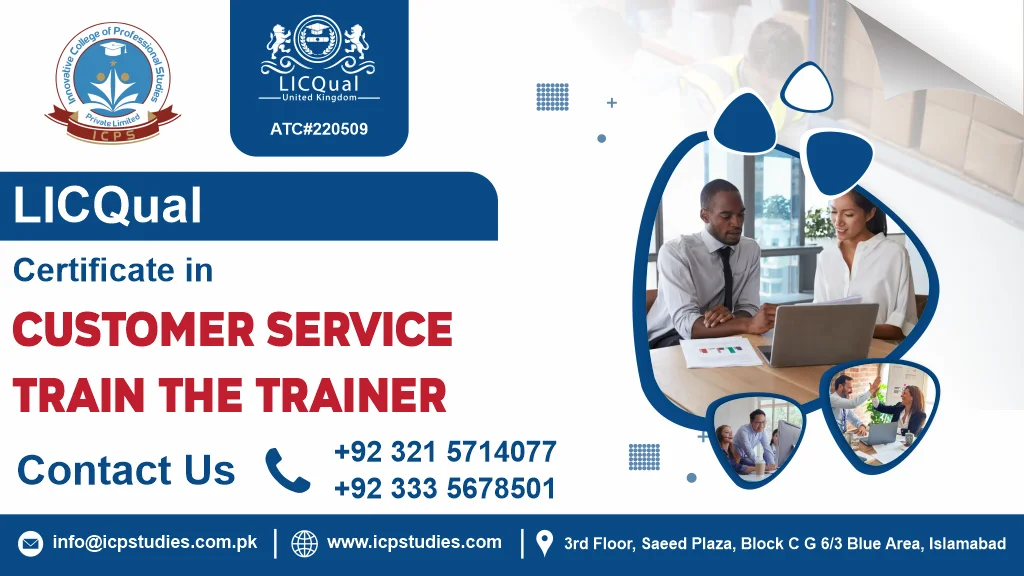In today’s competitive business landscape, delivering exceptional customer service is not just a goal—it’s a necessity. Organizations across industries are increasingly recognizing that their success hinges on the quality of interactions between their employees and customers. As such, the role of a Customer Service Trainer is more critical than ever. If you’re passionate about enhancing customer experiences and empowering others to excel in customer service, obtaining a Certificate in Customer Service Train the Trainer could be your gateway to making a significant impact.
A Certificate in Customer Service Train the Trainer is a specialized program designed to equip individuals with the skills and knowledge needed to effectively train others in delivering outstanding customer service. This certification covers a range of topics essential for developing and implementing training programs that enhance customer interactions, improve service standards, and align with organizational goals.
A Certificate in Customer Service Train the Trainer is more than just a credential; it’s a transformative tool that can elevate your career and significantly impact your organization’s customer service standards. By gaining advanced training skills and knowledge, you’ll be well-equipped to design and deliver effective training programs that drive excellence in customer service.
All About Certificate in Customer Service Train the Trainer
Course Overview
A Certificate in Customer Service Train the Trainer is a specialized qualification designed to develop and enhance the skills of individuals who are responsible for training others in the field of customer service. This certification program focuses on equipping professionals with the knowledge and expertise needed to create, deliver, and evaluate effective customer service training programs within an organization.
Certificate in Customer Service Train the Trainer is a valuable credential for those looking to excel in the field of customer service training. It provides the essential tools and techniques needed to train others effectively, ultimately leading to improved customer interactions and satisfaction within an organization.
Study Units
- Introduction to Customer Service Training
- Adult Learning Principles and Training Techniques
- Designing Customer Service Training Programs
- Delivering Engaging Customer Service Training
- Training Evaluation and Feedback
- Overcoming Challenges in Customer Service Training
To enroll in the LICQual Certificate in Customer Service Train the Trainer, candidates should meet the following criteria:
- Relevant Professional Background: Applicants should have experience in customer service roles, such as customer service representatives, team leaders, or managers.
- Minimum Qualification: A Level 2 qualification in customer service or a related field is typically required to ensure foundational knowledge of customer service principles.
- Training Experience: While prior experience in training or teaching is beneficial, it is not mandatory. Candidates should demonstrate a commitment to educating others on customer service best practices.
- Strong Communication Skills: Effective verbal and written communication skills are essential for delivering engaging training sessions and facilitating discussions.
- Customer Service Orientation: A genuine passion for providing excellent customer service and a desire to share this knowledge with others is crucial.
- Pre-Course Assessment: Some providers may require candidates to complete an assessment or interview to evaluate their suitability for the course.
- Understanding of Adult Learning Principles: Familiarity with adult learning theories and training methodologies is advantageous, although these concepts can be developed during the course.
To enroll in the LICQual Certificate in Customer Service Train the Trainer, candidates should meet the following criteria:
- Relevant Professional Background: Applicants should have experience in customer service roles, such as customer service representatives, team leaders, or managers.
- Minimum Qualification: A Level 2 qualification in customer service or a related field is typically required to ensure foundational knowledge of customer service principles.
- Training Experience: While prior experience in training or teaching is beneficial, it is not mandatory. Candidates should demonstrate a commitment to educating others on customer service best practices.
- Strong Communication Skills: Effective verbal and written communication skills are essential for delivering engaging training sessions and facilitating discussions.
- Customer Service Orientation: A genuine passion for providing excellent customer service and a desire to share this knowledge with others is crucial.
- Pre-Course Assessment: Some providers may require candidates to complete an assessment or interview to evaluate their suitability for the course.
- Understanding of Adult Learning Principles: Familiarity with adult learning theories and training methodologies is advantageous, although these concepts can be developed during the course.
Learning Outcome
1. Introduction to Customer Service Training
Learning Outcomes:
- Understand the Role of Customer Service Training: Articulate the significance of customer service training in enhancing customer interactions and organizational success.
- Identify Key Competencies: Recognize the essential skills and behaviors that effective customer service training aims to develop.
- Analyze Training Needs: Evaluate organizational needs to design training programs that address specific customer service challenges and objectives.
- Discuss Training Trends: Explore current trends and best practices in customer service training and their impact on employee performance and customer satisfaction.
2. Adult Learning Principles and Training Techniques
Learning Outcomes:
- Apply Adult Learning Theories: Utilize theories such as andragogy and experiential learning to design training that caters to adult learners’ needs and preferences.
- Recognize Learning Styles: Identify various learning styles and adapt training techniques to accommodate different types of learners.
- Implement Effective Training Methods: Apply a range of instructional techniques, including interactive activities, case studies, and role-plays, to enhance learning outcomes.
- Facilitate Active Learning: Employ strategies to engage participants actively and encourage participation and interaction during training sessions.
3. Designing Customer Service Training Programs
Learning Outcomes:
- Develop Training Objectives: Create clear, measurable learning objectives aligned with organizational goals and customer service standards.
- Design Training Materials: Develop comprehensive training materials, including manuals, handouts, and multimedia resources, tailored to customer service topics.
- Structure Training Sessions: Organize training content logically, ensuring a coherent flow of information and effective coverage of key customer service skills and knowledge.
- Incorporate Real-World Scenarios: Integrate practical examples and case studies relevant to customer service roles to facilitate real-world application of training content.
4. Delivering Engaging Customer Service Training
Learning Outcomes:
- Master Presentation Skills: Demonstrate strong presentation skills, including effective use of voice, body language, and visual aids to engage participants.
- Facilitate Group Discussions: Conduct engaging group discussions and activities that encourage participant interaction and knowledge sharing.
- Handle Difficult Situations: Manage challenging training scenarios and participant questions with confidence and professionalism.
- Use Feedback Effectively: Incorporate feedback from participants to adapt and enhance training delivery in real-time.
5. Training Evaluation and Feedback
Learning Outcomes:
- Design Evaluation Tools: Create and implement evaluation tools, such as surveys and assessments, to measure the effectiveness of training programs.
- Analyze Evaluation Data: Interpret data from evaluations to assess training impact, identify strengths and weaknesses, and make informed improvements.
- Provide Constructive Feedback: Deliver constructive feedback to participants to support their development and improve their customer service skills.
- Implement Continuous Improvement: Use evaluation results to refine training programs, ensuring they remain relevant and effective in meeting organizational objectives.
6. Overcoming Challenges in Customer Service Training
Learning Outcomes:
- Identify Common Challenges: Recognize common obstacles faced in customer service training, such as resistance to change or varying skill levels among participants.
- Develop Solutions: Formulate strategies to address and overcome these challenges, including tailoring content to different learning needs and managing diverse participant dynamics.
- Implement Change Management: Apply change management principles to support the successful adoption of new customer service practices and techniques.
- Foster a Positive Learning Environment: Create and maintain a positive and supportive training environment that encourages learning and development.
These learning outcomes ensure that participants in the Certificate in Customer Service Train the Trainer program acquire the essential skills and knowledge required to effectively design, deliver, and evaluate customer service training programs, ultimately leading to improved customer service standards and organizational success.
FAQs about Certificate in Customer Service Train the Trainer







